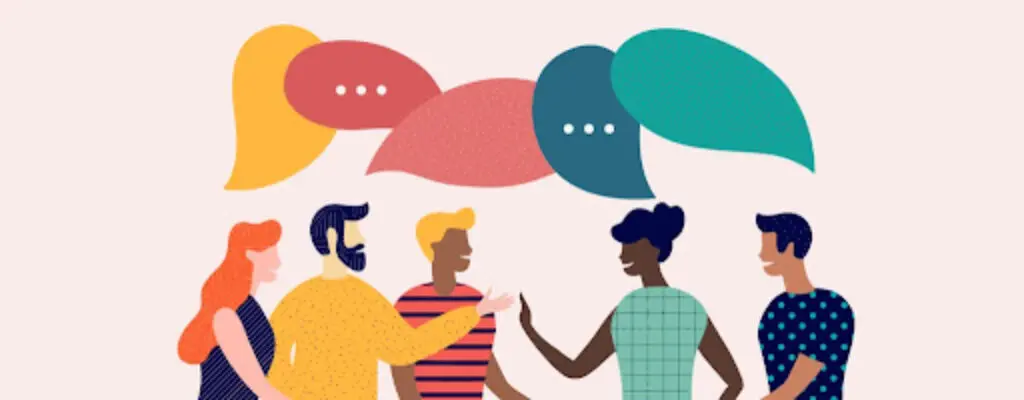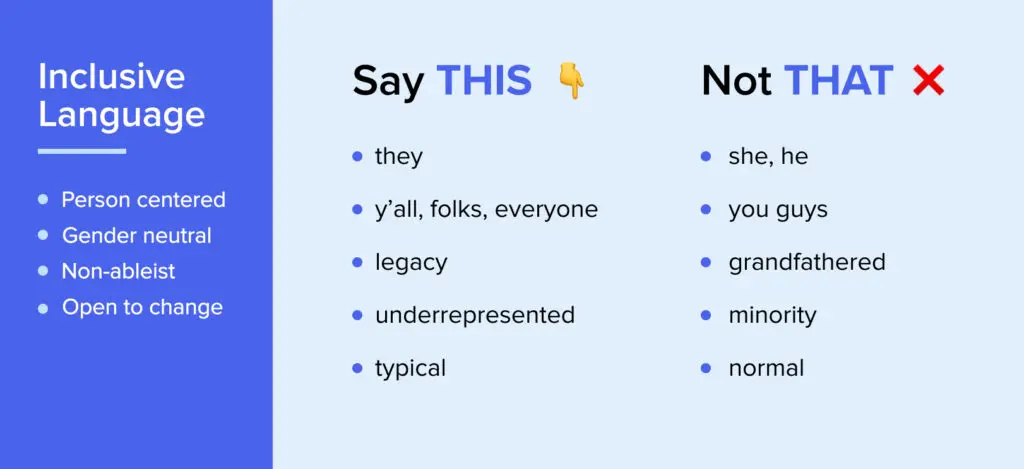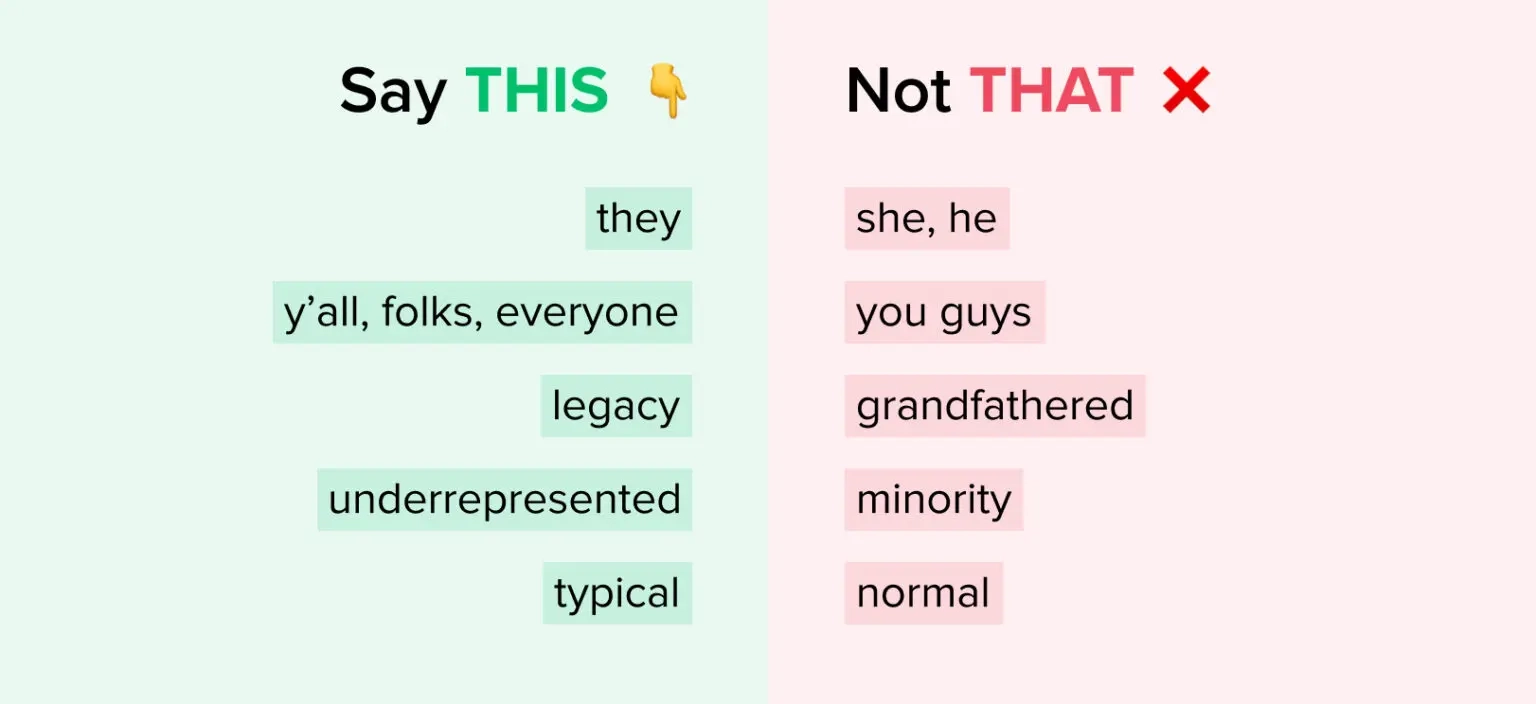Say This, Not That: Inclusive Language in the Workplace
Being sensitive and intentional with our words
by Aimie Ye - September 27th, 2021
A foundational skill to be successful in not only the workplace, but in practically any social setting, is understanding how to properly communicate whatever it is that you are trying to say. Today, we are more interconnected than ever, meaning that we are bound to come into contact with people from all walks of life. That’s why we need to be sensitive and intentional with our words. It isn’t just about being “politically correct,” it’s about making sure that everyone around you feels safe and supported in your shared space. What we say can make or break our relationships. Professionally, this carries immense weight, as using incorrect or offensive terminology can affect every aspect of the workplace, including your team’s dynamic and the effectiveness of your results. According to Gallup, 45% of workers in the U.S. reported experiencing some form of discrimination or harassment in their workplace. That is an overwhelming number, so it’s time that we tackle this issue from all avenues. Implementing inclusive language is a great place to start.

Gender Neutrality
The first concept to get a grasp on is gender neutrality. Using gender neutral terms to address your team allows you to stay respectful of gender non-conforming and fluid colleagues while still remaining applicable to your cisgendered team members.
Let’s take a look at some general examples.
Instead of:
Gals or Chicks
Girl of Boy
Mankind
Woman or Man
Hero or Heroine
Handsome or Beautiful
“Hey Guys!”
Gendered Insults
Try:
Team or Everyone
Young Person, Kid, or Teen
Humankind or People
Adult
Heroix
Attractive or Good-Looking
“Hey Y’all/Team/Everyone!”
Something like, “What a Bully!”

Here are some examples of terms you would commonly see in the workplace, and how to implement gender neutrality within them.
Instead of:
Businessman or Businesswoman
Mailman
Mr. or Mrs.
Chairman or Chairwoman
Policeman
Waiter or Waitress
Manned
Try:
Business Person
Mail Carrier or Postal Worker
Mx (Pronounced “Mix”)
Chairperson
Police Officer
Server or Table Attendant
Crewed
Mental Health Conditions
Mental health conditions also get thrown around far too casually and are often used to reference inappropriate and unrelated things. Doing so only reinforces and increases the ableist stigma around mental health and makes people who actually have these conditions feel outcasted from their peers. Some of these may seem like they are just casual terms we say in passing with little to no thought given to them, but we urge you to stop and think about how you’re affecting those around you.
For instance –
Instead of:
Insane, Crazy, or Mental
Lame
Stupid or Dumb
ADHD
OCD
Bipolar
Retarded
Try:
“Wow, That’s Wild!”
Uncool
Frustrating
“I had trouble focusing today.”
“I have a need for neatness.”
“It was all over the place.”
“That’s ridiculous.”
Remember – if you haven’t been diagnosed with it, you really don’t need to be throwing the term around.
Personal Identity/Culture Terms
Finally, take note of these two, as they pertain to culture and sexual orientation. These attributes lie at the core of who we are, so we want to avoid bending their terms into false contexts.
Instead of:
Ninja or Guru – These are terms that are linked with Asian cultures and have been adopted to mean “master” or “experienced.”
Gay – Not only does using LGBTQ+ terminology to describe something as “bad” not make sense, but it equates those identities with negativity.
Gypped – This term was coined from the term “Gypsy” and has become synonymous with “deceit.”
Ghetto – This term originates from when the Black community was forced into poor living conditions by White people.
Try:
“That Girl is a Design Rockstar!”
“That’s so Passé.”
Fooled
Run-Down
——————————————————————————————————————————-
Properly implementing these changes requires some unlearning of things we might say out of habit and learning some substitutions in their place. This is a great step in the direction of prioritizing diversity, equity, and inclusion in organizations all across the board. Remember, we are more than the mere characteristics that people can perceive about us. We are our talents, knowledge, and so much more. Let those attributes be the ones that primarily describe us instead of our physical and mental ones.
Search...
Product
GoCo
Resources
Articles
eBooks
Webinars
Customer Stories
